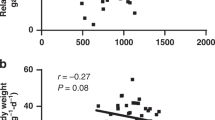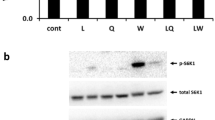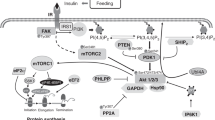Abstract
Protein synthesis (PS) increases after a meal in neonates, but the time course of the changes in PS in different tissues after a meal is unknown. We aimed to evaluate the changes in tissue PS, mammalian target of rapamycin complex 1 (mTORC1) activation, and proportion of ribosomal protein (rp) mRNAs in polysomes over 4 h after a bolus meal in neonatal pigs (n = 6/group; 5- to 7-d-old). The results show a more sustained increase in PS in glycolytic compared with mixed fiber type muscles and no changes in oxidative muscles. PS increased in liver, jejunum, and pancreas but not in kidney and heart. Feeding did not affect AMP-activated protein kinase or RAS-related GTP binding B activation. Phosphorylation of tuberous sclerosis complex 2, proline-rich Akt substrate of 40 kD, mTOR, eukaryotic initiation factor 4E binding protein, and rp S6 kinase 1 increased in all tissues after feeding. The proportion of mRNAs encoding rp S4 and S8 in liver polysomes increased within 30 min postfeeding. These results suggest that feeding stimulates mTORC1 signaling in muscle and viscera, but mTORC1 activation alone is not sufficient to stimulate PS in all tissues.
Similar content being viewed by others
Log in or create a free account to read this content
Gain free access to this article, as well as selected content from this journal and more on nature.com
or
Abbreviations
- AA:
-
amino acids
- AMPK:
-
AMP-activated protein kinase
- BCAA:
-
branched-chain AA
- EAA:
-
essential AA
- 4EBP1:
-
eukaryotic initiation factor 4E binding protein 1
- GAPDH:
-
glyceraldehyde 3-phosphate dehydrogenase
- mTORC1:
-
mammalian target of rapamycin complex 1
- ODC:
-
ornithine decarboxylase
- PRAS40:
-
proline-rich Akt substrate of 40 kDa
- PS:
-
protein synthesis
- Rag:
-
Ras-related GTP binding protein
- rp:
-
ribosomal protein
- S6K1:
-
rp S6 kinase 1
- TAA:
-
total AA
- TSC2:
-
tuberous sclerosis complex 2
References
Denne SC, Kalhan SC 1987 Leucine metabolism in human newborns. Am J Physiol 253: E608–E615
Denne SC, Rossi EM, Kalhan SC 1991 Leucine kinetics during feeding in normal newborns. Pediatr Res 30: 23–27
Ehrenkranz RA 2007 Early, aggressive nutritional management for very low birth weight infants: what is the evidence?. Semin Perinatol 31: 48–55
Saigal S, Stoskopf BL, Streiner DL, Burrows E 2001 Physical growth and current health status of infants who were of extremely low birth weight and controls at adolescence. Pediatrics 108: 407–415
Stephens BE, Vohr BR 2009 Neurodevelopmental outcome of the premature infant. Pediatr Clin North Am 56: 631–646
Neubauer AP, Voss W, Kattner E 2008 Outcome of extremely low birth weight survivors at school age: the influence of perinatal parameters on neurodevelopment. Eur J Pediatr 167: 87–95
Davis TA, Burrin DG, Fiorotto ML, Nguyen HV 1996 Protein synthesis in skeletal muscle and jejunum is more responsive to feeding in 7-than in 26-day-old pigs. Am J Physiol 270: E802–E809
Davis TA, Fiorotto ML, Nguyen HV, Reeds PJ 1993 Enhanced response of muscle protein synthesis and plasma insulin to food intake in suckled rats. Am J Physiol 265: R334–R340
Davis TA, Fiorotto ML 2009 Regulation of muscle growth in neonates. Curr Opin Clin Nutr Metab Care 12: 78–85
Suryawan A, O'Connor PM, Bush JA, Nguyen HV, Davis TA 2009 Differential regulation of protein synthesis by amino acids and insulin in peripheral and visceral tissues of neonatal pigs. Amino Acids 37: 97–104
O'Connor PM, Bush JA, Suryawan A, Nguyen HV, Davis TA 2003 Insulin and amino acids independently stimulate skeletal muscle protein synthesis in neonatal pigs. Am J Physiol Endocrinol Metab 284: E110–E119
Suryawan A, O'Connor PM, Kimball SR, Bush JA, Nguyen HV, Jefferson LS, Davis TA 2004 Amino acids do not alter the insulin-induced activation of the insulin signaling pathway in neonatal pigs. J Nutr 134: 24–30
O'Connor PM, Kimball SR, Suryawan A, Bush JA, Nguyen HV, Jefferson LS, Davis TA 2003 Regulation of translation initiation by insulin and amino acids in skeletal muscle of neonatal pigs. Am J Physiol Endocrinol Metab 285: E40–E53
Suryawan A, Orellana RA, Nguyen HV, Jeyapalan AS, Fleming JR, Davis TA 2007 Activation by insulin and amino acids of signaling components leading to translation initiation in skeletal muscle of neonatal pigs is developmentally regulated. Am J Physiol Endocrinol Metab 293: E1597–E1605
Wang L, Harris TE, Roth RA, Lawrence JC Jr, 2007 PRAS40 regulates mTORC1 kinase activity by functioning as a direct inhibitor of substrate binding. J Biol Chem 282: 20036–20044
Kim E, Goraksha-Hicks P, Li L, Neufeld TP, Guan KL 2008 Regulation of TORC1 by Rag GTPases in nutrient response. Nat Cell Biol 10: 935–945
Davis TA 2008 Insulin and amino acids are critical regulators of neonatal muscle growth. Nutr Today 43: 143–149
O'Connor PM, Kimball SR, Suryawan A, Bush JA, Nguyen HV, Jefferson LS, Davis TA 2004 Regulation of neonatal liver protein synthesis by insulin and amino acids in pigs. Am J Physiol Endocrinol Metab 286: E994–E1003
Wilson FA, Suryawan A, Orellana RA, Kimball SR, Gazzaneo MC, Nguyen HV, Fiorotto ML, Davis TA 2009 Feeding rapidly stimulates protein synthesis in skeletal muscle of neonatal pigs by enhancing translation initiation. J Nutr 139: 1873–1880
Escobar J, Frank JW, Suryawan A, Nguyen HV, Kimball SR, Jefferson LS, Davis TA 2005 Physiological rise in plasma leucine stimulates muscle protein synthesis in neonatal pigs by enhancing translation initiation factor activation. Am J Physiol Endocrinol Metab 288: E914–E921
Davis TA, Fiorotto ML, Beckett PR, Burrin DG, Reeds PJ, Wray-Cahen D, Nguyen HV 2001 Differential effects of insulin on peripheral and visceral tissue protein synthesis in neonatal pigs. Am J Physiol Endocrinol Metab 280: E770–E779
Suryawan A, Davis TA 2010 The abundance and activation of mTORC1 regulators in skeletal muscle of neonatal pigs are modulated by insulin, amino acids and, age. J Appl Physiol 109: 1448–1454
Wilson FA, Suryawan A, Gazzaneo MC, Orellana RA, Nguyen HV, Davis TA 2010 Stimulation of muscle protein synthesis by prolonged parenteral infusion of leucine is dependent on amino acid availability in neonatal pigs. J Nutr 140: 264–270
Burrin DG, Davis TA, Ebner S, Schoknecht PA, Fiorotto ML, Reeds PJ, McAvoy S 1995 Nutrient-independent and nutrient-dependent factors stimulate protein synthesis in colostrum-fed newborn pigs. Pediatr Res 37: 593–599
Davis TA, Fiorotto ML, Burrin DG, Reeds PJ, Nguyen HV, Beckett PR, Vann RC, O'Connor PM 2002 Stimulation of protein synthesis by both insulin and amino acids is unique to skeletal muscle in neonatal pigs. Am J Physiol Endocrinol Metab 282: E880–E890
Suryawan A, Escobar J, Frank JW, Nguyen HV, Davis TA 2006 Developmental regulation of the activation of signaling components leading to translation initiation in skeletal muscle of neonatal pigs. Am J Physiol Endocrinol Metab 291: E849–E859
Vary TC, Lynch CJ 2006 Meal feeding stimulates phosphorylation of multiple effector proteins regulating protein synthetic processes in rat hearts. J Nutr 136: 2284–2290
Reiter AK, Anthony TJ, Anthony JC, Jefferson LS, Kimball SR 2004 The mTOR signaling pathway mediates control of ribosomal protein mRNA translation in rat liver. Int J Biochem Cell Biol 36: 2169–2179
Stoll B, Burrin DG, Henry JF, Jahoor F, Reeds PJ 1999 Dietary and systemic phenylalanine utilization for mucosal and hepatic constitutive protein synthesis in pigs. Am J Physiol 276: G49–G57
Elango R, Pencharz PB, Ball RO 2002 The branched-chain amino acid requirement of parenterally fed neonatal piglets is less than the enteral requirement. J Nutr 132: 3123–3129
Perry RP, Meyuhas O 1990 Translational control of ribosomal protein production in mammalian cells. Enzyme 44: 83–92
Acknowledgements
We thank Rosemarie Almonaci and Sharon Rannels for technical assistance, Jerome Stubblefield and Rickey Bryant for animal care, E. O'Brian Smith for statistical assistance, Adam Gillum for graphics, and Linda Weiser for secretarial assistance.
Author information
Authors and Affiliations
Corresponding author
Additional information
Supported, in part, by the National Institutes of Health grants R01 AR-44474, R01 DK15658, and K08 AR-51563 and the USDA/ARS under Cooperative Agreement number 6250510000-33.
Rights and permissions
About this article
Cite this article
Gazzaneo, M., Orellana, R., Suryawan, A. et al. Differential Regulation of Protein Synthesis and mTOR Signaling in Skeletal Muscle and Visceral Tissues of Neonatal Pigs After a Meal. Pediatr Res 70, 253–260 (2011). https://doi.org/10.1203/PDR.0b013e3182276cfa
Received:
Accepted:
Issue date:
DOI: https://doi.org/10.1203/PDR.0b013e3182276cfa
This article is cited by
-
Protein delivery in intermittent and continuous enteral nutrition with a protein-rich formula in critically ill patients—a protocol for the prospective randomized controlled proof-of-concept Protein Bolus Nutrition (Pro BoNo) study
Trials (2020)
-
Dietary leucine supplementation minimises tumour-induced damage in placental tissues of pregnant, tumour-bearing rats
BMC Cancer (2016)
-
Viscera and muscle protein synthesis in neonatal pigs is increased more by intermittent bolus than by continuous feeding
Pediatric Research (2013)



